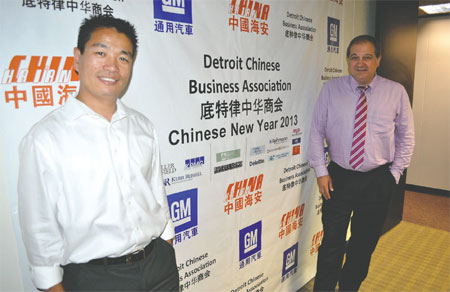Detroit has a secret weapon
|
Jerry Xu, president of Detroit Chinese Business Association, and Milan Stevanovich, business community development officer of DCBA, in front of Chinese New Year sign showing automotive industry sponsorship of events that marked Chinese New Year. Michael Barris / China Daily |
The "epicenter" of Michigan's outreach to China is the Detroit Chinese Business Association. Just ask Milan Stevanovich.
"We get the first call," the executive director said, "and we put organizations together."
The non-profit business network in Troy, Michigan, about 25 miles north of Detroit, plays an important role in fostering bilateral business relationships between US and Chinese companies, often brokering major deals.
In the past few years, the DCBA has done its part to boost Chinese business in the US, and vice-versa by:
Hosting visits by Chinese officials that helped spur the $500 million acquisition in 2010 by Pacific Century Motors of steering-maker Nexteer Automotive;
Introducing Chinese auto parts conglomerate Wanxiang Group to US battery maker A123 Systems Inc, paving the way for the Chinese company's $250 million purchase last fall of the bankrupt US company's assets;
Organizing meetings between associates of the city of Beijing and auto-parts supplier Delphi Co that brought about Delphi's $100 million sale in 2009 of its brakes-and-suspension business to a joint venture established by the Beijing municipal government.
Founded in 1995, the DCBA has put together American and Chinese government agencies, automotive OEMs and Tier 1 suppliers, and other manufacturing and service companies and organizations. Overseen by a seven-member volunteer board and operated by a part-time office manager, various interns and 10 to 20 volunteers, the organization promotes business opportunities by providing its members and the metropolitan Detroit business community with business conferences, exhibitions, networking events and consulting services.
But its real value may lie in matchmaking. "The Chinese are a little bit more complex to deal with than other countries and business people," said Stevanovich, the DBCA's only full-time staff member, who also sits on the board. "The DBCA comes in handy when a very large deal is at stake and the Chinese team is not getting through to the American side, or vice versa. We go in there and massage what needs to be massaged and get those deals closed."
The DBCA has won kudos from the likes of Tom Watkins, the former Michigan state schools superintendent who is regionally well-known as a builder of educational, cultural and economic bridges between the US and China.
In his blog, Watkins wrote that during a DCBA-hosted Chinese New Year celebration this spring, guest speaker Zhao Weiping, China's consul general to Chicago, lauded the DCBA as "an important ambassador between the People's Republic of China and Michigan".
Zhao, Watkins added, "correctly noted the DCBA has helped make connections that have resulted in creating jobs and opportunities in both Michigan and China".
DCBA President Jerry Xu said the organization functions as "a great bridge" for Chinese investors "to come here and get to know people". Sometimes, he said, the visitors are large companies with abundant talent and acumen in doing business in the US. But "there are a lot of medium and small businesses from China that need help when they come here", Xu said.
In recent years, the typical investor has been a player from China's automotive industry, aiming to make a name in the global marketplace via Detroit, which has a mythic reputation in the eyes of the Chinese. Understanding that the path to success is through Motor City, "they have to find a way to push through and come to the US, to the Michigan area, to realize that aspiration," Xu said. The DCBA counts about 100 Chinese-owned businesses, mostly auto-related, in the region.
But Chinese from other fields also are coming to the area, lured by its wealth of engineering expertise. Driven by the Twelfth Five Year Plan's mandate, "the Chinese are coming in looking for clean technologies, looking for environmental and water solutions, looking for medical healthcare", Stevanovich said.
The Wanxiang-A123 deal was an example of the dividends that can be harvested from knowing what is at the top of the mind for China's leadership, Stevanovich said. "We knew, because we read China's (Twelfth) Five Year Plan, that they're calling for 500,000 electric cars on the road by 2015," he recalled. So when the University of Michigan and Wayne County hosted a visit by a Chinese delegation that included the vice-energy minister, "we gave them an introduction to A123 Systems, which began the conversations that led up to the purchase last fall", the director said.
"But did we know that they were going to buy them out? No. We were just looking to create (dialogue). My goal is (to determine) what can we do to bring Chinese investments here" and "open up market share for a plethora of dynamic Michigan innovative companies and technologies".
The DCBA's biggest challenge, Stevanovich said, is countering the media's heavy focus on the city of Detroit's problems. In March, the governor put the city - which is suffering from physical degradation, shrinking population and high unemployment levels - under the stewardship of an emergency manager. Negotiations underway with the city's creditors are aimed at possibly avoiding what would be the largest municipal bankruptcy filing in US history.
"There's still 5 million people who live in the Detroit metropolitan area for a good reason," Stevanovich said. "It's a great place to grow a family. It's a great place to live."
Michigan, he said, "has a lot of innovation, ideas, a lot of design, a lot of technologies. So a lot of smart Chinese companies are coming here to partner up. At the same time, they can go back to China and elsewhere globally and open up market share.
"I think it's a great win-win for all parties."



















